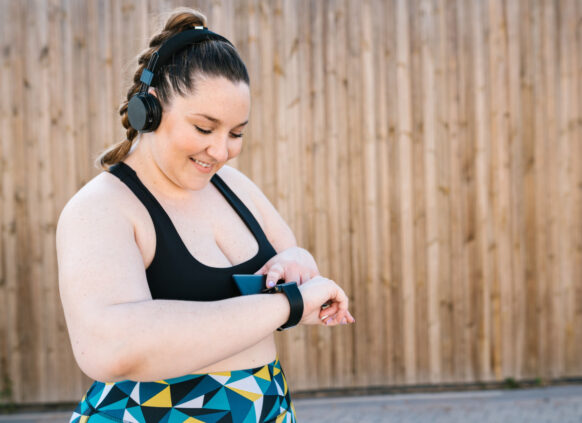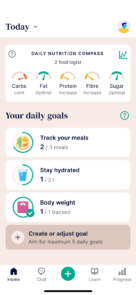
Semaglutide vs. liraglutide for weight loss
Semaglutide and liraglutide are two weight loss medications used by the NHS to treat obesity. They are designed to be used with healthy lifestyle changes to your diet, exercise and habits for safe and effective weight loss.
If you’re referred to a specialist weight management service like Oviva, you could receive an NHS prescription for weight loss medication like semaglutide and liraglutide. If you’re exploring your options, understanding how each one works can help you feel more informed and prepared for the next step in your journey.
Key Takeaways
- Semaglutide and liraglutide are both effective weight-loss medications.
- Semaglutide and liraglutide are currently available for NHS prescription.
- Studies show that semaglutide is generally more effective for weight loss. Semaglutide is also taken once a week, whereas liraglutide is taken once a day.
- To receive a prescription, you’ll need to be referred to a weight management service like Oviva. Eligibility criteria include a BMI over 35 and relevant comorbidities.
What’s the difference between semaglutide and liraglutide?
Semaglutide and liraglutide are both weight-loss injections and belong to a class of medications called GLP-1 agonists. Both are used to treat obesity and type 2 diabetes. Semaglutide and liraglutide are also available for NHS prescription to people who meet the eligibility criteria for joining a weight loss programme like Oviva.
Within the NHS, semaglutide prescribed for weight loss purposes is distributed under the brand name Wegovy, while liraglutide is usually distributed under the brand name Saxenda.
The biggest difference between the two medications regarding usage is the frequency with which they are taken. Semaglutide injections are taken once a week, while liraglutide injections are taken once a day. This is because semaglutide lasts longer in the body.

Another difference is the dosage for semaglutide vs liraglutide. Generally, people start on a 0.25 mg/week dosing schedule for semaglutide and gradually work up to 2.4 mg/week. With liraglutide, people typically begin on 0.6 mg/day and work up to 3.0 mg/day.
There’s also a difference in terms of effectiveness. In clinical trials, semaglutide has been found to be more effective than liraglutide for weight loss, which we’ll cover in the next section.
Semaglutide vs liraglutide: how do they compare?
One clinical study by Rubino et al. directly compared the weight loss results between semaglutide and liraglutide 68 weeks. Some patients were given 2.4 mg semaglutide injections once weekly, while others were given 3.0 mg liraglutide injections once daily. These doses align with the recognised maintenance dose for each. Both groups were also assisted with wider lifestyle interventions related to diet and exercise.
Semaglutide outperformed liraglutide in the trial. The mean weight loss in the semaglutide group was 16% of total body weight, compared to 6.4% in the liraglutide group.
The key differences between semaglutide and liraglutide
| Semaglutide (Wegovy) | Liraglutide (Saxenda) | |
| Approved Uses | Weight loss and type 2 diabetes | Weight loss and type 2 diabetes |
| Recommended Dosage* | 2.4 mg/week | 3.0 mg/day |
| How to Take | Self-administered injection, taken once a week | Self-administered injection, taken once a day |
| NHS Availability | Prescribed as part of approved weight management services | Prescribed as part of approved weight management services |
| Average Weight Loss | 16% of total body weight over 68 weeks | 6.4% of total body weight over 68 weeks |
* The dosage recommended by your doctor may differ from this based on your circumstances. Always follow the advice of healthcare professionals.
Semaglutide vs. liraglutide: understanding the side effects
The side effects of semaglutide and liraglutide are similar because their underlying mechanisms are similar. Some of the most common side effects of both medications are gastrointestinal problems, including nausea, diarrhoea, constipation, vomiting and stomach pain.
Most of these side effects are mild and ease over time. If you’re taking other medications that could impact blood glucose levels, hypoglycaemia is a potential side effect, too.
It’s difficult to anticipate precisely which side effects you may encounter and whether they will be worse with semaglutide compared with liraglutide.
Some people may experience more side effects with liraglutide, partly because it’s taken every day rather than once a week. However, experiences can vary from one person to the next.

When might you be prescribed one vs the other?
As semaglutide has been seen to be more effective than liraglutide, you may be prescribed that particular weight loss injection. However, other factors will affect this decision.
For instance, the availability of the two medicines when you’re prescribed a weight loss treatment can influence which medication you’re given.
Some people may have a personal preference based on how the medication is taken. For example, you may find it easier to remember to take a medication every day, which could make liraglutide preferable, or you may find it preferable to self-administer an injection less frequently, which would favour semaglutide. Speak to a healthcare professional about this.
Healthcare professionals will work with you to prescribe the best medication for your needs.
Can I switch from semaglutide to liraglutide or vice versa?
It’s possible to switch from either semaglutide or liraglutide to the other medication, and this may be recommended for various reasons, including to reduce side effects or to move to a more effective medication, which will usually mean moving to semaglutide.
You must discuss this with a healthcare professional, as any transition should be managed carefully. Moving from liraglutide to semaglutide is easier to manage because your first dose of semaglutide can be taken the day after your final liraglutide injection. Moving from semaglutide to liraglutide requires waiting a week from your last injection.
How can Oviva help?
Oviva is an NHS-funded weight management service that can help you on your weight loss journey.
If you’re referred to Oviva, you could be prescribed weight loss injections, like semaglutide, and receive professional support on the lifestyle changes you can make to support you weight loss journey.
You’ll have access to our free app where you can get personalised coaching, real-time feedback on the meals you’re making, mental health support and more.
You may be eligible for referral to Oviva if you have a BMI over 35 with relevant comorbidities, like type 2 diabetes, depression, or high blood pressure.
Want to get started with Oviva? Our info pack tells you everything you need to start your Oviva journey, including speaking to your GP about whether you’re eligible.








